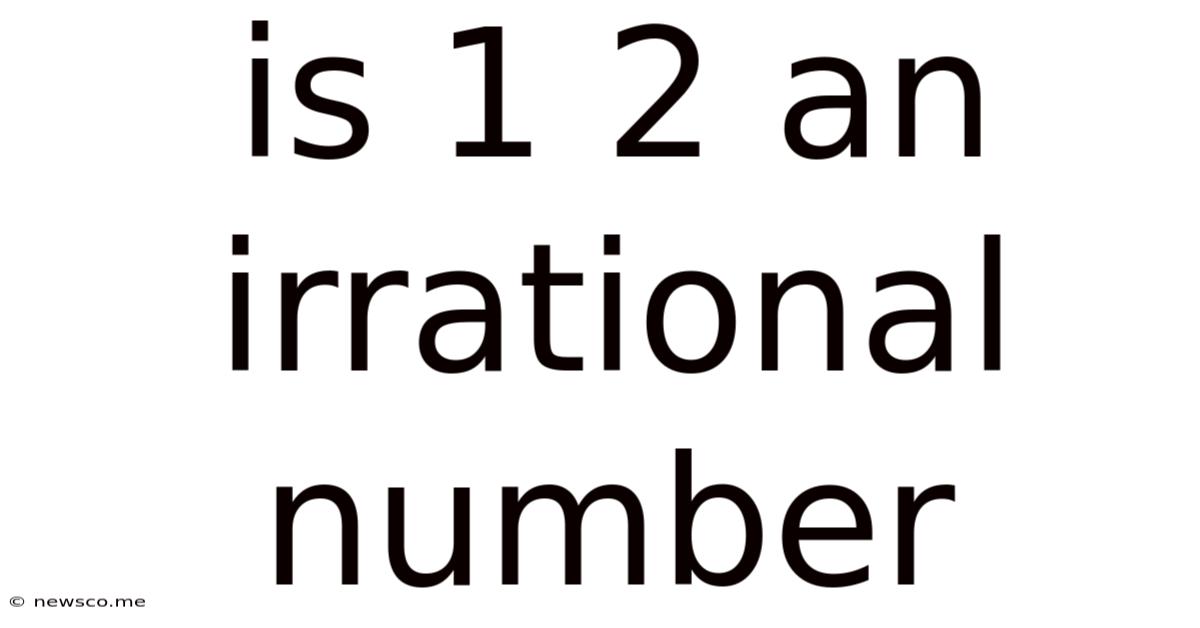Is 1 2 An Irrational Number
News Co
Apr 22, 2025 · 5 min read

Table of Contents
Is 1/2 an Irrational Number? A Deep Dive into Rational and Irrational Numbers
The question, "Is 1/2 an irrational number?" might seem simple at first glance. However, understanding the answer requires a firm grasp of the definitions of rational and irrational numbers. This article will not only definitively answer the question but also provide a comprehensive exploration of rational and irrational numbers, delving into their properties and providing examples to solidify your understanding.
Understanding Rational Numbers
A rational number is any number that can be expressed as a fraction p/q, where both 'p' and 'q' are integers, and 'q' is not equal to zero. This seemingly simple definition encompasses a vast range of numbers.
Examples of Rational Numbers:
- Integers: All whole numbers, both positive and negative (e.g., -3, 0, 5), are rational because they can be expressed as a fraction with a denominator of 1 (e.g., -3/1, 0/1, 5/1).
- Fractions: Any number that can be written as a fraction, like 1/2, 3/4, -7/9, is by definition a rational number.
- Terminating Decimals: Decimals that end after a finite number of digits are rational. For example, 0.75 can be written as 3/4, and 2.5 can be written as 5/2.
- Repeating Decimals: Decimals that have a repeating pattern of digits are also rational. For instance, 0.333... (which is 1/3) and 0.142857142857... (which is 1/7) are both rational numbers, even though their decimal representation goes on forever. The key is the repeating pattern.
Understanding Irrational Numbers
In contrast to rational numbers, irrational numbers cannot be expressed as a fraction of two integers. Their decimal representation is non-terminating and non-repeating. This means the digits after the decimal point continue infinitely without ever settling into a repeating pattern.
Examples of Irrational Numbers:
- √2 (the square root of 2): This is a classic example. Its decimal representation begins 1.41421356..., and it continues infinitely without any repeating sequence. It's impossible to express √2 precisely as a fraction of two integers.
- π (pi): The ratio of a circle's circumference to its diameter, π is approximately 3.14159..., but its decimal representation continues endlessly without repeating.
- e (Euler's number): This fundamental constant in mathematics, approximately 2.71828..., is another example of an irrational number with a non-terminating, non-repeating decimal expansion.
- The golden ratio (φ): Approximately 1.618..., this number is found in various natural phenomena and has a non-repeating, non-terminating decimal expansion.
The Proof: Why 1/2 is Rational, Not Irrational
Now, let's directly address the central question: Is 1/2 an irrational number? The answer is definitively no.
1/2 is a rational number because it perfectly fits the definition of a rational number. It can be expressed as a fraction where both the numerator (1) and the denominator (2) are integers, and the denominator is not zero. This satisfies all the requirements for a number to be classified as rational.
Furthermore, its decimal representation is 0.5, which is a terminating decimal. As explained above, terminating decimals are always rational numbers.
Distinguishing Between Rational and Irrational Numbers: A Practical Approach
It's crucial to be able to quickly distinguish between rational and irrational numbers. Here's a practical approach:
-
Check for Fractional Representation: Can the number be written as a fraction p/q, where p and q are integers and q ≠ 0? If yes, it's rational.
-
Examine the Decimal Representation: If the decimal representation terminates (ends) or repeats, the number is rational. If it's non-terminating and non-repeating, it's irrational.
-
Consider Known Irrational Numbers: Be aware of common irrational numbers like √2, π, e, and the golden ratio. If a number is related to these (e.g., a multiple or a simple algebraic combination), it might be irrational, requiring further investigation to confirm.
Common Misconceptions about Irrational Numbers
Several misunderstandings frequently surround irrational numbers:
-
Non-terminating decimals are always irrational: This is incorrect. Repeating decimals, even though they are non-terminating, are still rational. The repeating pattern allows them to be expressed as fractions.
-
Irrational numbers are somehow "strange" or less important: This is a misconception. Irrational numbers are fundamental to mathematics, appearing in various areas, from geometry (π) to calculus (e).
-
All square roots are irrational: This is false. The square roots of perfect squares (e.g., √4 = 2, √9 = 3) are rational.
The Importance of Understanding Rational and Irrational Numbers
The distinction between rational and irrational numbers is fundamental to various branches of mathematics, including:
-
Number Theory: This branch of mathematics heavily relies on the properties of rational and irrational numbers to explore relationships between integers and solve complex problems.
-
Calculus: Understanding irrational numbers is critical for working with limits, derivatives, and integrals.
-
Geometry: Irrational numbers, particularly π, are essential in geometric calculations involving circles and other curved shapes.
-
Algebra: Irrational numbers play a significant role in solving equations and working with various algebraic structures.
Conclusion: 1/2 is Definitely Rational
In conclusion, 1/2 is unequivocally a rational number. It meets the definition of a rational number, can be represented as a simple fraction (1/2), and has a terminating decimal representation (0.5). Understanding the difference between rational and irrational numbers is crucial for a solid foundation in mathematics and various related fields. This article aimed to provide a clear, comprehensive, and SEO-optimized explanation to help readers solidify their understanding of these fundamental mathematical concepts. Remember the key points: fractions and terminating or repeating decimals are your clues to identify rational numbers. Non-terminating, non-repeating decimals point toward the fascinating world of irrational numbers.
Latest Posts
Related Post
Thank you for visiting our website which covers about Is 1 2 An Irrational Number . We hope the information provided has been useful to you. Feel free to contact us if you have any questions or need further assistance. See you next time and don't miss to bookmark.